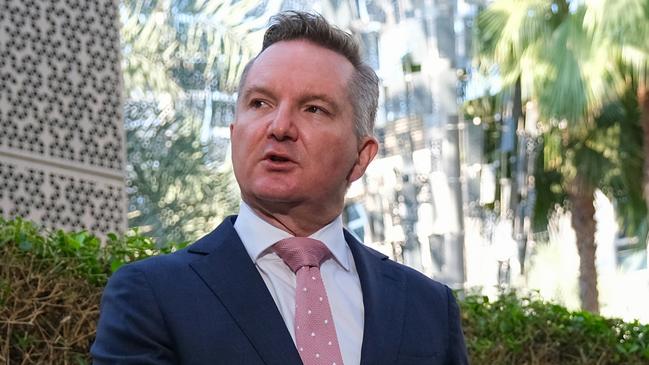Prioritise cost of living pressures over power company profits, Chris Bowen says
Chris Bowen says the energy pricing regulator should prioritise cost-of-living pressures over guaranteeing already ‘healthy’ company profits.

Climate Change and Energy Minister Chris Bowen says the energy pricing regulator should prioritise cost-of-living pressures over guaranteeing already “healthy” company profits, as he batted away big power companies’ complaints their margins are being unreasonably squeezed.
Mr Bowen on Thursday morning stopped short of labelling the firms as “greedy” for putting pressure on the regulator to maintain industry profit margins amid intense cost of living pressures. But in a further sign of the growing chasm between Labor and corporate Australia, he made it clear he had little sympathy for their concerns.
“Energy company profits have been healthy, and I think in this spirit, in this environment of cost-of-living pressure, it’s quite right that the Australian Energy Regulator would prioritise cost of living, and I know my state and territory ministers agree with me about that,” he said.
“Accordingly, that is what I expect the Australian Energy Regulator would do. Of course we want profitable energy companies, but we want families receiving cost-of-living relief as well.”
The AER this year approved price increases by as much as 25 per cent on the east coast to allow retailers to recoup losses from a global energy crunch that sent their costs soaring to near record levels.
NSW Energy Minister Penny Sharpe urged the AER to consider an alternative method to calculate the retail profit allowance, currently set at a margin of about 10 per cent.
In a submission to the regulator, Ms Sharpe said it was important to ensure that the hit to households from energy price volatility was not “compounded” by “a fixed percentage methodology” which “still increased allowable retail margins in dollar terms significantly in NSW and other jurisdictions”.
She said one option would be to “set an absolute profit value per customer”, or to reduce the retail allowance.
Tony Wood, the director of the Grattan Institute’s energy program, said the discussions around the retail margin allowance needed to be put in the context of a 2024 default market offer that should be lower than the previous year’s.
Mr Wood said he was not convinced by the The Australian Energy Council’s argument that the “pendulum has swung well away from supporting reasonable and efficient margins”.
But he went on to acknowledge that “we do know that the margin between the DMO and the market offers has shrunk, and shopping around is no longer a particularly effective strategy for consumers”.
The 20-25 per cent increase in the DMO price determined this year reflected in large part the costs associated with the unprecedented energy crisis of mid-2022, when soaring global energy prices clashed with a surge in demand and the failure of coal-fire power plants.
“If we haven’t had that sort of situation, we should actually see a decrease in prices in the middle of next year, all else being equal,” Mr Wood said.
“The big issue is going to be what sort of summer we have,” he added.
Snowy Hydro-owned Red Energy in their submission to the energy regulator argued against giving “more weight to protecting disengaged consumers from elevated prices rather than providing headroom for competition”.
“We encourage the AER to continue to apply the pricing objectives in a balanced way. Any deviation from this in DMO jurisdictions will adversely impact retail competition to the detriment of energy consumers,” the submission said.




To join the conversation, please log in. Don't have an account? Register
Join the conversation, you are commenting as Logout